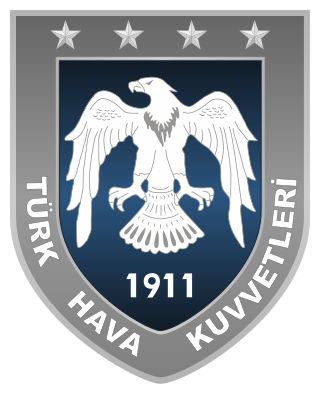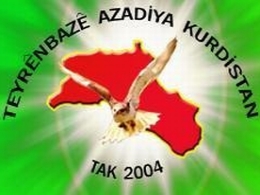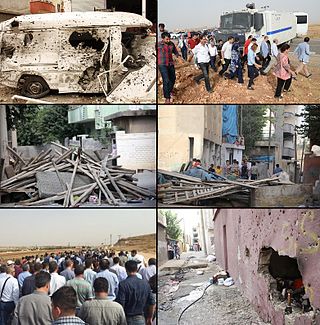
The Turkish Air Force is the aerial warfare service branch of the Turkish Armed Forces. It traces its origins to June 1911 when it was founded as the Aviation Squadrons by the Ottoman Empire. It was composed of the Army Aviation Squadrons founded in 1911, and the Naval Aviation Squadrons founded in 1914 which used seaplanes. The Air Force as a branch of the Turkish Armed Forces was founded by the Grand National Assembly of Turkey on 23 April 1920.

The Kurdistan Freedom Hawks or TAK, is a Kurdish nationalist militant group in Turkey seeking an independent Kurdish state in Turkish Kurdistan. The group also opposes the Turkish government's policies towards Kurds in Turkey.

October 1992 Turkish attack on Hakurk Camp was a cross-border operation by the Turkish Armed Forces into northern Iraq between 12 October and 1 November 1992, that was conducted during the October 1992 Turkish incursion into Northern Iraq, against the Kurdistan Workers Party (PKK) which is listed as a terrorist organization internationally by a number of states and organizations, including the United States, NATO and the EU. More than 70,000 people have been killed in the Kurdish–Turkish conflict since 1984.

The 2008 Turkish incursion into northern Iraq, code-named Operation Sun by the Turkish Armed Forces, began on February 21, 2008, when the Turkish Army sent troops into northern Iraq to target the Kurdistan Workers' Party (PKK). The ground offensive was preceded by Turkish Air Force bombardments of PKK camps in northern Iraq, which began on December 16, 2007. It was the "first confirmed ground incursion" of Iraq since the 2003 U.S.-led invasion.

This is the timeline of the Turkish-Kurdish conflict. The Kurdish insurgency is an armed conflict between the Republic of Turkey and various Kurdish insurgent groups, which have demanded separation from Turkey to create an independent Kurdistan, or to have autonomy and greater political and cultural rights for Kurds in Turkey. The main rebel group is the Kurdistan Workers' Party or PKK, which was founded on November 27, 1978, and started a full-scale insurgency on August 15, 1984, when it declared a Kurdish uprising. Apart from some extended ceasefires, the conflict has continued to the present day.

The October 2011 Çukurca attacks are the PKK's attacks targeting Turkish Armed Forces units in Hakkâri's Çukurca district on October 19, 2011. After midnight, 200 PKK members opened fire on police and gendarmerie buildings and security points in the district center with heavy weapons, resulting in 24 Turkish soldiers killed and 18 wounded. Between 21 and 23 PKK militants were killed in the conflict, and around 250-270 PKK militants were killed in the post-conflict operations, and 210 were injured.
The Gendarmerie Special Operations or JÖH, is the special operations unit of the Turkish Gendarmerie General Command. Its tasks include search and destroy, infiltration, and reconnaissance. Members of the unit receive extensive training at the Jandarma School at Foça and also from selected Turkish Armed Forces instructors. All three of its companies work under the direction of the army regions to which they are assigned, but can also receive tasking from their headquarters in Ankara. It was established in 1991, at the height of the Turkish–Kurdish conflict. It has recently been involved in the Turkish occupation of northern Syria. Unit members are in the 16-week training rooms at the Gendarmerie Commando Terrorist Operations School Command in Foça. All kinds of light weapons, mortar use, rocket launcher training, maneuvering training under fire, destroying target, target mountaineering, using GPS, finding directions over long distances, camouflage, being able to withstand fatigue and insomnia, making the right decision under stress, adapts to different climate and land needs, fight against terrorism in a residential area, explosive recognition, destruction, helicopter evacuation, contact helicopter and helicopter steering, transition through the water, basic diving, melee combat,ınformation on survival, boat operation, commando training, combat maps, weapons and shootings, explosives and traps are given combat training. The person who completes the course becomes a commando. Commando candidates run 300+ kilometers, walk more than 1100+ kilometers and stay in the field for 61 nights. Trainees are expected to complete a 10-kilometer rifle run, a 15-kilometer country run, and a 30-kilometer strength run with full equipment.After the commando training, a sniper course is also given. Gendarmerie Special Operations course lasts 6 months. İt is organized in Ankara, İzmir and Kayseri with land, air and sea phases. Gendarmerie officers, non-commissioned officers and experts who have received basic gendarmerie commando training can attend the course. Combat training in severe cold in Kayseri or Bolu Basic diving in Ankara In İzmir Foça, the helicopter jump boat operator receives training such as close combat, forestry, airplane-bus-train operations, residential operation, frogman, special operations and Paratrooper.Special operations candidates ran a total of 675+ kilometers under running conditions. At the end of the training, the student will have the ability to plan and conduct special operations in buildings, land, air and railway vehicles in all kinds of terrain and climatic conditions at home and abroad.
Operation Martyr Yalçın was a military operation conducted by the Turkish Air Force against Islamic State of Iraq and the Levant (ISIL) positions in Syria, and Kurdistan Workers' Party (PKK) positions in northern Iraq, on 24 and 25 July 2015.
In late July 2015, the third phase of the Kurdish–Turkish conflict between various Kurdish insurgent groups and the Turkish government erupted, following a failed two and a half year-long peace process aimed at resolving the long-running conflict.

The 2015–2016 Şırnak clashes were a series of armed clashes in the southeastern Şırnak province, between Turkish government forces and Kurdish armed groups, as part of the Turkish–Kurdish conflict.
Operation Claw was a cross-border military operation by the Turkish Armed Forces into Iraq's autonomous Kurdistan Region against the Kurdistan Workers' Party.
The joint Claw-Eagle and Claw-Tiger operations was a Turkish Armed Forces external operation in northern Iraq. The operation took place in the Qandil Mountains, the Sinjar District, and Makhmur, against Kurdistan Workers' Party (PKK) targets, as part of the ongoing Kurdish–Turkish and Kurdish–Iranian conflicts. Claw-Eagle, the air campaign, began on 15 June 2020. Claw-Tiger, the ground campaign, was launched on 17 June.

The December 2007 Turkish incursion into northern Iraq, by the Turkish Air Force, began on 16 December 2007, when the Turkish Military bombed Kurdistan Workers' Party (PKK) targets in northern Iraq.

The August 1986 Turkish incursion into northern Iraq, by the Turkish Air Forces and Turkish Land Forces, began on 15 August 1986, when the Turkish Military bombed Kurdistan Workers' Party (PKK) targets in northern Iraq and Turkish troops crossed the Iraqi border as a respond to PKK attack in Uludere, Hakkari on 12 August 1986 which killed 12 Turkish soldiers and injured 10 others.

The March 1987 Turkish incursion into northern Iraq, by the Turkish Air Force, began on 4 March 1987, when the Turkish Military bombed Kurdistan Workers' Party (PKK) targets in northern Iraq. 30 war planes were used in the operation and 3 major PKK camps was bombed.
Operation Claw-Eagle 2 was an air and ground operation launched by the Turkish Armed Forces against the Kurdistan Workers' Party (PKK) in the Duhok Governorate of the Kurdistan Region of northern Iraq. According to Turkey, it was launched to secure the border between Turkey and Iraq and to eliminate the PKK in the area and to rescue Turkish hostages held by the PKK.
Claw-Lightning and Claw-Thunderbolt were Turkish Armed Forces cross border military operations in northern Iraq. The operations took place in the Metina, Zap and Avashin-Basyan regions against Kurdistan Workers' Party (PKK) targets, as part of the ongoing Kurdish–Turkish conflict.
Operation Claw-Lock was a military operation of the Turkish Armed Forces in northern Iraq. The operation was taking place in the Duhok Governorate against the Kurdistan Workers' Party (PKK), as part of the ongoing Kurdish–Turkish conflict.

The Kurdistan Workers' Party insurgency is an armed conflict between the Republic of Turkey and the Kurdistan Workers' Party, as well as its allied insurgent groups, both Kurdish and non-Kurdish, who have either demanded separation from Turkey to create an independent Kurdistan, or attempted to secure autonomy, and/or greater political and cultural rights for Kurds inside the Republic of Turkey.









